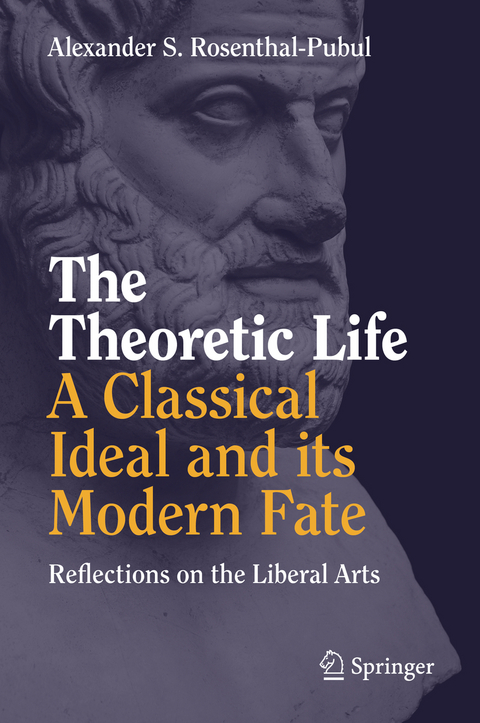
The Theoretic Life - A Classical Ideal and its Modern Fate
Springer International Publishing (Verlag)
978-3-030-02280-8 (ISBN)
In this work, Alexander Rosenthal Pubul presents a broad examination of the ancient philosophical question: "What is the good life?", while addressing how the liberal arts can help us to answer this question. Greek philosophy distinguished between the "noble" (what is good in itself), from the merely "useful" (good for something else). From thence follows the distinction between the liberal arts which pursue such noble goods and the mechanical arts which are only instrumental. For Aristotle, the most noble and excellent good is wisdom itself. Hence the theoretic life devoted to the love of wisdom for its own sake -philosophy - is the highest and the most excellent.
This work theorizes the origins of modernity in a rebellion against this Greek conception resulting in a complete inversion of the classical hierarchy. Sir. Francis Bacon reconceiving the purpose of knowledge as power, enthroned technology over philosophy and theliberal arts. The unfolding of the modern Baconian revolution progressively sidelines the liberal arts, as practical economic and technical utility become the standard of value. In assessing this problem, the book engages in a capacious journey across disciplines like philosophy, history, art, politics, and science. It is also a veritable tour across the Western intellectual tradition including Socrates, Plato, Aristotle, Cicero, Seneca, Thomas Aquinas, Bacon, Descartes, Hume, Kant, Nietzsche, Dewey, Berdyaev, Einstein, and Heidegger. It pleads the urgent need to preserve the humanizing cultural ideals of the ancient classics against the modern tyranny of utility and the dangers of a new barbarism.
Alexander Rosenthal Pubul PhD Presently a Lecturer from his home in Spain for Johns Hopkins University (Center for Advanced Governmental Studies) where he formerly served as Assistant Director, and currently teaches in political thought. Dr. Rosenthal received his bachelor's degree in philosophy from Princeton University in 1994 and his PhD in Philosophy from the Katholieke Universisteit Leuven in 2005. His research interests include philosophy and European intellectual history. Among his publications is his book Crown Under Law (2008) which deals with the intellectual origins of modern constitutionalism. He has taught at a number of colleges and universities including Loyola College (Maryland), and Catholic University of America (CUA), the University of Glasgow (Scotland). He is the co-founder and director of the Petrarch Institute, which focuses on the classical humanities tradition
Acknowledgements.- About the Author.- Table of Figures.- Part I - The Emergence of the Theoretic Life in Classical Greek Philosophy.- Chapter 1. The New Barbarism: The Contest between Classical Humanist Culture and Techno-Economic Pragmatism.- Chapter 2. In Pursuit of the Noble: The Classical Birth of the Liberal Arts.- Chapter 3: The Political and the Theoretic Life - the Challenge of Socrates.- Chapter 4. Aristotelian Teleology: The Bridge Between Natural Philosophy and the problem of "the Good Life".- Chapter 5. The Aristotelian Revolution: The Autonomy of the Theoretic Life and the Dream of Universal Science.- Part II. The Baconian Revolt against Greek Theoria and the Modern Birth of the Technological Mind.- Chapter 6. The Rebirth of Time: Sir. Francis Bacon and the Origins of Modernity.- Chapter 7. Bacon´s New Magic: The Transfigured Aim of the Sciences.- Chapter 8. Technology Displaces Metaphysics - Bacon´s New Hierarchy of the Arts and Sciences.- Chapter9. Breaking Aristotle´s Bridge: The Modern Philosophical Critique of Teleology.- Chapter 10. The Enlightenment as a Baconian Revolution.- Chapter 11. Metaphysics Dethroned: Hume, Kant, and the "Self-Limitation of Reason".- Chapter 12. -Progressivism, Commerce, and the Triumph of Machine Civilization.- Chapter 13. The Classical Ideal of High Culture in the Democratic Age.- Chapter 14. Dewey and the Greeks in Contention: The Theoretic Life and the Challenge of American Pragmatism.- Chapter 15. A Reply to Dewey.- Chapter 16. The Contemporary Crisis of the Humanities: The Ideological Attack on the Western Canon and The Long Arm of Nietzsche, Marx, and Foucault.- Chapter 17. The New Protrepticus: A Concluding Exhortation to the Theoretic Life.- Index.
| Erscheinungsdatum | 16.01.2019 |
|---|---|
| Zusatzinfo | XIX, 165 p. 7 illus. |
| Verlagsort | Cham |
| Sprache | englisch |
| Maße | 155 x 235 mm |
| Gewicht | 439 g |
| Themenwelt | Geisteswissenschaften ► Philosophie ► Philosophie Altertum / Antike |
| Schlagworte | Aristotelian Revolution • Aristotle • Bacon, Descartes, Spinoza, and Hobbes • Baconian Revolution • Bacon, the Ancients, And the Rebirth of Time • Contemporary Crisis of the Humanities • Crisis of Humanist Culture • Good life and human happiness • Hume, Kant, and the Dethronement of Metaphysics • Modern Revolution • Natural cosmology and the human place within it • philosophy and politics • Politics and Ethics • Socrates • Socratic and Aristotelian ideals • Techno-Economic Pragmatism • The New Barbarism • Theoretic Life and the Supreme Good • Theoretic Life in Classical Greek Philosophy |
| ISBN-10 | 3-030-02280-3 / 3030022803 |
| ISBN-13 | 978-3-030-02280-8 / 9783030022808 |
| Zustand | Neuware |
| Haben Sie eine Frage zum Produkt? |
aus dem Bereich


